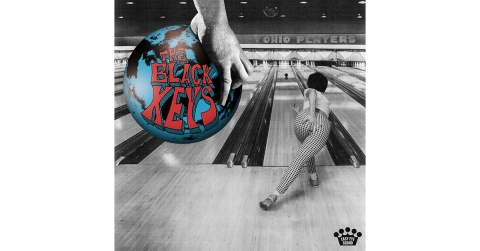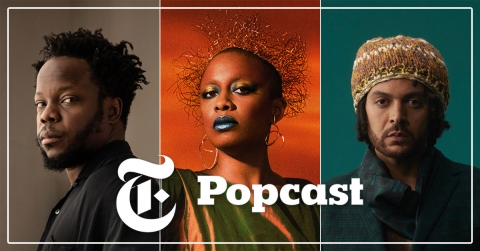Kronos Quartet's latest Nonesuch release, Floodplain, is out now. The New Statesman names it among the year's best, a "celebration of Middle Eastern, Balkan and African musical traditions, recast for string quartet to truly joyous effect." Songlines gives the album a perfect five stars, calling it "one of their most assertive statements in years." Billboard says "the album champions the rich sonic tapestries" of the regions it showcases, and the Detroit Free Press writes, "You can never predict where the intrepid Kronos Quartet is going next, but you can count on an interesting journey." MusicOMH interviews David Harrington, the music director of the group OMH calls "one of the world's busiest, eclectic, and perhaps most creative ensembles."
Kronos Quartet's latest Nonesuch release, Floodplain, is out now, featuring music from Egypt to Azerbaijan, written by an array of artists, from the Palestinian music collective Ramallah Underground to Serbian-born composer Alexandra Vrebalov.
The New Statesman names Floodplain among the best albums of 2009 so far, an honor the magazine bestows upon label mates Wilco (Wilco (the album)) and Oumou Sangare (Seya) as well. "While the Bush administration was busy demonising foreign cultures," the magazine declares, "the American new music ensemble Kronos was devising this celebration of Middle Eastern, Balkan and African musical traditions, recast for string quartet to truly joyous effect." See the complete list at newstatesman.com.
---
Songlines gives Kronos's latest a perfect five stars, placing it among the best new releases out now and calling it "one of their most assertive statements in years." Reviewer Simon Broughton sees the Quartet's interpretation of the album's repertoire as the creation of "adventurous new pieces reflecting the flavour of the original repertoire."
Broughton notes as "most spectacular" the tune "Getme, Getme," featuring the Azerbaijani sextet the Alim Qasimov Ensemble. He writes:
With voices and strings intertwining, it is an ecstatic performance, recorded live at last year’s Ramadan Nights at the Barbican. It’s the first live recording they’ve ever released, in over 30 years, and the glorious music takes Kronos into an exciting new world.
Read the review at songlines.co.uk. You can watch video the Barbican performance of "Getme, Getme" at nonesuch.com/media.
---
Billboard magazine's Ronald Hart says "the album champions the rich sonic tapestries" of the regions it showcases. And Detroit Free Press music critic Mark Stryker writes, "You can never predict where the intrepid Kronos Quartet is going next, but you can count on an interesting journey." He cites, in particular, "the sinewy tunefulness and tango-like rhythm" of the opening track, "Ya Habibi Ta'ala," and the "mournful sigh" of "Kara Kemir," a track "that pulsates with tragedy and hope." Read that review at freep.com.
---
MusicOMH features an extensive interview with David Harrington, the music director of the group OMH writer Ben Hogwood calls "one of the world's busiest, eclectic, and perhaps most creative ensembles." The two discuss the new album and its place in the Quartet's career-long quest to discover and showcase different musics from around the world. Says Hogwood, "Few ensembles have done more for the string quartet in recent years than the Kronos Quartet, pushing the boundaries of a long-established instrumental medium that can be traced back over two and a half centuries."
Harrington offers hints at a few upcoming commissions by as varied a slate of composers as one might expect from Kronos, including longtime collaborators, like Steve Reich, Terry Riley, and Henryk Górecki, as well as new works from a rather different world, including Blur/Gorillaz front man Damon Albarn (who contributed to Amadou & Mariam's latest, Welcome to Mali) and the National's Bryce Dessner.
"I think the world of music has never been more thrilling or exciting than it is right now," says Harrington. "We've never had a time when so many things are possible, and I want to make experiences, concerts and recordings that point to new possibilities or ways of imagining this art form, the string quartet, that Haydn started in around 1750."
You'll find the article at musicomh.com.
- Log in to post comments



